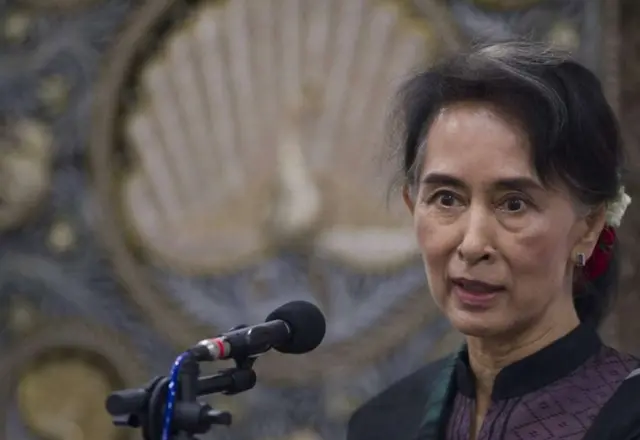Aung San Suu Kyi leaves democratically led Myanmar this week for military-ruled Thailand on an official visit that highlights the changing fortunes of the Southeast Asian neighbours.
Myanmar, now governed by Suu Kyi’s National League for Democracy after elections last year, is emerging from a half-century of military rule, while Thailand, Myanmar’s second largest trading partner after China with total trade last year valued at US$8.1 billion, is struggling to find a path back to civilian rule after the army seized power more than two years ago.
“The state visit will bring into relief an interesting reversal of political circumstances between the neighbouring countries but will be largely pragmatic in tone,” said Herve Lemahieu, a research associate at the International Institute for Strategic Studies in London. He said he expects talks to focus on trade, investment and migrant labour.
After decades of watching Thailand develop while it languished in isolation, Myanmar is now projected to have the fastest economic growth in Southeast Asia this year at 8.4 per cent, while Thailand is forecast to have some of the slowest growth at 3 per cent as it deals with the fallout of military rule and struggles to avoid the middle-income trap. Investors have taken note, with foreign direct investment in Myanmar surging to a record US$9.4 billion in the fiscal year ended March, while Thailand saw an almost 70 per cent plunge in applications last year.
“Thailand has taken the recent authoritarian Myanmar model, while they have taken Thailand’s heyday model of the 1980s,” said Kobsidthi Silpachai, head of capital research at Kasikornbank Pcl in Bangkok. Myanmar was appealing due to its cheap labour, largely untapped consumer market and abundant natural resources, while in Thailand a lack of policy continuity was scaring off investors, he said.
In Myanmar and Thailand, two militaries moving in opposite directions
Both countries are facing a constitutional conundrum, with Suu Kyi’s party campaigning to push the army out of politics and the generals in Thailand seeking voter approval in an August referendum for a draft document that would give them more power. For now Myanmar appears to have reached a working compromise between the army and civilians, while Thailand hasn’t.
Myanmar army chief General Min Aung Hlang (left) shakes hands with Thai Supreme Commander Sommai Kaotira after arriving in Bangkok on May 25, 2016. The Burmese general was on a three day visit to Thailand. Photo: AFP
“The Myanmar military has succeeded in co-opting Aung San Suu Kyi and the NLD into a power-sharing relationship which is superficially democratic, but insulates the Myanmar military from actual civilian control,” said Paul Chambers, director of research at the Institute of Southeast Asian Affairs in Chiang Mai. “The Thai generals undoubtedly long for a Myanmar future.”
Historic moment: Suu Kyi’s allies form Myanmar’s ruling party after decades of struggle
Suu Kyi, who holds several positions in the government including foreign minister, will be visiting Thailand in her capacity as state counsellor, a post “above the president” that her government created in order to get around a constitutional ban on her holding that position. She wasn’t the first senior Myanmar leader since the election to be hosted by Thailand’s junta, however, an honour given to army chief Min Aung Hlaing last montThis may be a form of hedging but also reflects the Tatmadaw’s continued role in regional foreign policy and in Myanmar’s political economy,” Lemahieu said, using the official name of the Myanmar armed forces. Military leaders in both Thailand and Myanmar “speak of a long-lasting role for the military in public life until ‘democratic maturity’ is achieved in their respective countries”.
For Myanmar, the real test for the civilian government starts now
It is Suu Kyi’s second trip abroad since taking power in April, having first travelled with her hand-picked President Htin Kyaw to Laos, which currently holds the rotating chair of the Association of Southeast Asian Nations. The new leaders appear to be prioritising ties with fellow members of Asean, despite Suu Kyi viewing the bloc with “antipathy for years of neglect of the Burmese democracy movement”, Lemahieu said.
“While Suu Kyi’s ties with West are well established – and her party has over the past five years has been successful in cultivating ties with Beijing – relations with Asean countries are comparatively underdeveloped,” Lemahieu said. “The new government has made it a priority to bridge a lag in high-level working ties.”
‘No longer a backward nation’: Myanmar launches first stock exchange
Suu Kyi is expected to sign accords on labour and border crossings during her three-day trip. She is scheduled to pay a visit to a town hosting some of the millions of migrants from Myanmar who work in Thailand, as she did to a hero’s welcome on a visit in 2012, her first travel outside Myanmar in 24 years. She had previously refused to leave Myanmar, including when her husband was dying in England in 1999, fearing that she wouldn’t be allowed to return.
Suu Kyi’s fight against the junta in her country and her years under house arrest, which led to her being awarded the Nobel Peace Prize in 1991, broadened her international appeal as a “democracy icon.” That image has taken a hit in recent years after she was criticised for not speaking out against the treatment of Rohingya Muslims and other minorities at home. Her visit with Thailand’s junta is unlikely to help.
“She has de-prioritised her earlier championing of universal freedoms and human rights in exchange for the preferences of power politics,” Chambers said. “She is now a politician.”
According to Sithu Aung Myint, a Yangon-based political analyst, Suu Kyi shouldn’t be criticised for her visit because it is only natural for her to travel to Thailand.
“I don’t see there being many problems in the relationship between Myanmar and Thailand, regardless of which type of government both sides have,“ he said. ”Regardless of military or civilian government, we have do deal with our neighbouring country.
(RUETERS)
 简体中文
简体中文

